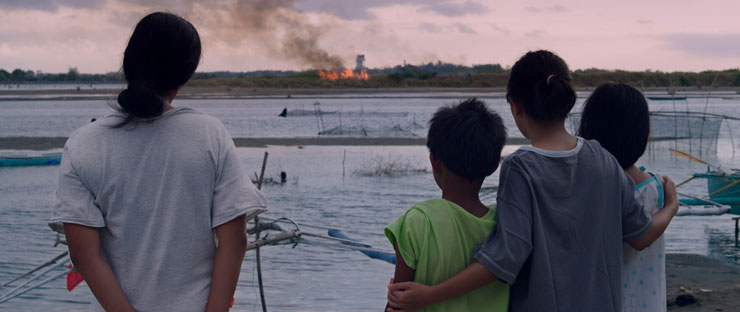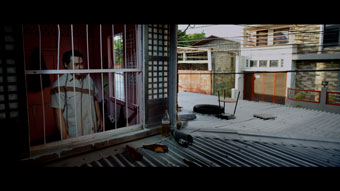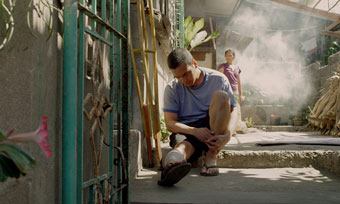
FROM LEFT: Angeli Bayani, Joel Cabacungan, Hazel Orencio, Charlotte Cabacungan

Sid Lucero
Norte, the End of History is like a dense forest just begging to be explored. The journey is challenging, and it’s easy to become lost, but you come out on the other side grateful you decided to take the plunge. Clocking in at just over four hours, it’s safe to say this sprawling meditation on wrongdoing and its ripple effects across space and time demands the kind of commitment that comes more naturally to hardcore cinephiles than to less invested moviegoers. It also heralds the arrival of Filipino filmmaker Lav Diaz’s work to U.S. shores, and he’s got the chops to back up the daunting scope of his (very loose) take on Dostoyevsky’s “Crime and Punishment.”
Stripped to its bare essentials, Norte follows two men from different walks of life as their lives intersect, even though, irony of ironies, they remain strangers to each other. Fabian (Sid Lucero), a law school dropout, spends his hours debating Filipino politics and history with his former classmates. Their philosophical musings during the extended conversation that opens the film, carried out in English-speckled Tagalog, set the stage for the thematic grandiloquence that follows. “Truth is dead. So is meaning,” says Fabian to the disapproval of his friends, who see right through his hipsterish posturing. Diaz opts to let the scene play out in long shot without any cuts, then abruptly interrupts it when people’s screams outside the coffee shop Fabian and his buddies are sitting in lead them to run outside to find a bleeding woman laying on the street. Fabian’s colleagues are horrified, but he just stares at the writhing victim with fascination as the sun peeks in behind him.

FROM LEFT: Archie Alemania, Angeli Bayani
Meanwhile, in another part of the northern province of Ilocos Norte, where the bulk of Norte unfolds, financially disadvantaged family man Joaquin (Archie Alemania) is finally coming home from the hospital following a mishap that left him in crutches. It soon becomes clear he and his wife Eliza (Angeli Bayani) are deeply indebted to neighborhood loan shark Magda (a delicious Mae Paner). Eliza first sells off their pig – “Too skinny!” snorts Magda – then pawns a ring her father gave her – Magda’s assessment: “Hmmm. Not that valuable” – before realizing she and her family are facing abject poverty. In an act of sheer desperation, Joaquin comes to Magda’s bourgeois abode to sell her some DVDs. When she says no, he lunges at her and goes for the throat, thus acting out this critic’s wish-fulfillment fantasy.
Joaquin runs, knowing that he’s done for if Magda chooses to call the cops on him. Meanwhile, Fabian broods, has occasional empty sex with the girlfriend of one of his law school buddies, then broods some more. Unbeknownst to the viewer until well over an hour into Norte, the alienated intellectual also owes money to Magda. What happens next will come as no surprise to readers familiar with the the film’s source material, but suffice it to say injustice reigns supreme, and Diaz forces viewers to suffer along with the innocent, to bear witness as remorse eats away at the guilty, as months, then years go by. A prison sentences is served, first under duress and strife, then with more serene acceptance. Above all, Diaz seems to be telling us, life goes on, and we have to live with the weight of our choices, confront the hand fate has dealt us, even if it’s not quite what we would have preferred.

FROM LEFT: Charlotte Cabacungan, Angeli Bayani, Joel Cabacungan
Viewers expecting more narrative thrust in this existential epic will find themselves hitting a brick wall repeatedly. There is plenty of incident in Norte, but the film is not propelled by its ricocheting series of events. It also ceases to be about the characters’ personal journeys. They recede into the background, as they become dots in cinematographer Lauro Rene Manda’ vast, desolate vistas. Diaz uses stunning widescreen compositions to convey a miasma of despair, to conjure up landscapes where no good deed goes unpunished and where no one in able to evade misfortune.
My inner crime story nut sometimes wished Diaz trimmed some of the fat. Fabian’s interminable tête-à-têtes, for instance, make the film feel longer in ways its captivating longueurs do not. OK, so Norte is far from Diaz’s shortest feature. His 2004 drama Evolution of a Filipino Family, for instance, runs a whopping nine hours. A revered figure of “slow cinema,” Diaz refuses to subscribe to the “less is more” school of cinematic storytelling, and even though the film’s deliberate pace can make even the most patient movie buff more than a tad fidgety, the aesthetic payoff justifies the running time, particularly during the film’s quietly devastating second half. There are echoes of Hungarian master Béla Tarr, Mexican auteur Carlos Reygadas and French misanthrope Bruno Dumont in Diaz’s slow-burn mise en scene. This is the work of a filmmaker blessed with the gift of chronicling the unbearable heaviness of being. He basks in the redemptive glow of thematic ambition.
Norte, the End of History is showing at the Miami Beach Cinematheque through Sept. 7. It’s a limited engagement. Visit www.mbcinema.com for showtimes.




